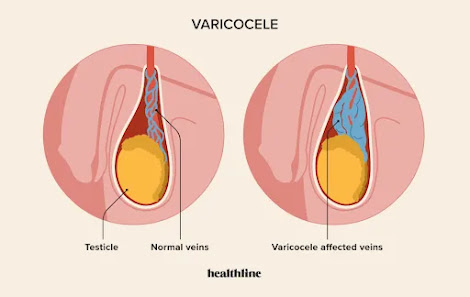Varicocele, a condition characterized by enlarged veins within the scrotum, affects a significant portion of the male population worldwide. Understanding the intricacies of Varicocele, including its causes, symptoms, and treatment options, is crucial for individuals grappling with this condition.
In this detailed guide, we delve into the depths of Varicocele, shedding light on its nuances to empower readers with the knowledge necessary for effective management.
Understanding Varicocele
Varicocele, often likened to varicose veins that occur in the legs, is a condition where the veins within the scrotum become dilated and swollen. This dilation typically occurs in the pampiniform plexus, the network of veins that drain blood from the testicles. The prevalence of Varicocele is higher in males aged between 15 and 25 years, although it can occur at any age.
Varicocele is primarily classified into two types: primary and secondary. Primary Varicocele occurs spontaneously and is often associated with anatomical variations or structural abnormalities within the testicular veins. Conversely, Secondary Varicocele develops due to factors such as abdominal masses or obstructions in the venous drainage system.
Causes of Varicocele
The exact cause of Varicocele remains elusive, although several factors contribute to its development. Key causes include:
Hormonal Imbalance:
Hormonal fluctuations, particularly those involving testosterone, may disrupt the normal functioning of the valves within the veins, leading to Varicocele.
Structural Abnormalities:
Anomalies in the structure of the veins or their surrounding anatomy can predispose individuals to Varicocele.
Genetic Predisposition:
A family history of Varicocele increases the likelihood of developing the condition, suggesting a genetic component in its etiology.
Symptoms of Varicocele
Varicocele may manifest with various symptoms, albeit some individuals may remain asymptomatic. Common symptoms include:
Scrotal Swelling
Testicular Discomfort
Infertility
Diagnosis and Evaluation
Diagnosing Varicocele typically involves a thorough physical examination, including palpation of the scrotum to assess for swelling or enlargement. Additional diagnostic tests may include:
Doppler Ultrasound:
A non-invasive imaging technique that evaluates blood flow within the scrotal veins, aiding in the diagnosis of Varicocele.
Semen Analysis:
Assessment of sperm count, motility, and morphology to determine the impact of Varicocele on fertility.
Treatment Options
The management of Varicocele depends on various factors, including the severity of symptoms and the individual's reproductive goals. Treatment options may include:
Observation:
Asymptomatic Varicoceles may require no intervention but necessitate regular monitoring to detect any progression or worsening of symptoms.
Surgical Repair:
Surgical procedures such as varicocelectomy involve ligating or occluding the dilated veins to improve blood flow and alleviate symptoms.
Interventional Radiology:
Minimally invasive techniques, such as embolization, aim to block the abnormal blood flow in the affected veins, offering symptomatic relief.
Preventive Measures
While the prevention of Varicocele may not be entirely feasible, adopting certain lifestyle modifications and precautions can help mitigate the risk. These include:
Maintaining Optimal Testicular Temperature:
Avoiding prolonged exposure to heat, such as hot baths or saunas, helps regulate testicular temperature and minimize vein dilation.
Adequate Physical Activity:
Regular exercise promotes healthy blood circulation and vascular function, reducing the likelihood of developing Varicocele.
Choose Dr. Nikhil Bansal for Varicocele Treatment in Jaipur?
Dr. Nikhil Bansal is a very renowned and trusted Interventional Radiologist in Jaipur, who has vast experience in the field of Varicoceles treatment. For the best effective treatment of varicocele, Dr. Nikhil is one of the best and experienced surgeons to do this varicocele surgery at an affordable cost.
FAQs (Frequently Asked Questions)
1. What are the primary risk factors for Varicocele?
Varicocele risk factors include hormonal imbalances, structural abnormalities, and genetic predisposition.
2. Is Varicocele always associated with infertility?
While Varicocele may impair sperm production and quality, not all individuals with Varicocele experience infertility.
3. Can Varicocele resolve on its own without treatment?
In some cases, Varicocele may remain asymptomatic or spontaneously resolve without the need for intervention.
Is Varicocele more prevalent in certain age groups?
Varicocele is commonly observed in males aged between 15 and 25 years but can occur at any age.
Are there any non-surgical treatment options for Varicocele?
Yes, minimally invasive procedures such as embolization offer alternative treatment modalities for Varicocele.
Can Varicocele recur after surgical treatment?
While uncommon, Varicocele recurrence may occur following surgical intervention, necessitating careful postoperative monitoring.



0 Comments